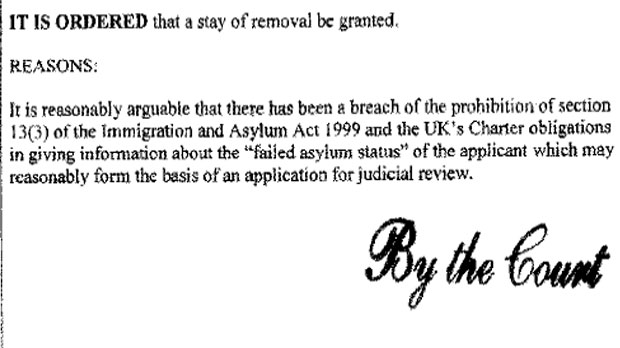Legal bids fail to halt Sri Lanka deportee flight
A plane chartered by the British Government to return failed asylum seekers to Sri Lanka has landed in Colombo following the failure of last-minute legal efforts to prevent it leaving.
Frantic efforts by lawyers in London succeeded in delaying the plane’s scheduled departure but it eventually left late on Wednesday night.
Immigration lawyers had been seeking last-minute stays on the grounds that returnees – many of whom have claimed past links with the banned Liberation Tigers of Tamil Eelam – risked interrogation and torture on arrival back in Sri Lanka.
An unknown number of Tamils who were to have been on the flight and who had appealed for judicial review of their cases had their High Court removal orders overturned in the Court of Appeal.
On Wednesday evening, one appeal court judge went so far as to overturn one Tamil woman’s removal orders on the grounds that the UK Border Agency had breached British and European law by disclosing potentially sensitive information on the individual to the Sri Lankan authorities, thus placing her at greater risk upon her return.

Offical government correspondence relating to the scheduled removal flight which was obtained by Channel 4 News contains a remarkable admission.
In separate letters, two government departments concede that the UKBA had “inadvertently” disclosed potentially sensitive information to the Sri Lankan authorities on 14 individuals – although none, it insists, were to have been deported on Wednesday.

Since the end of a brutal civil war in Sri Lanka in May 2009, human rights groups have repeatedly highlighted serious concerns over the safety of members of the island’s Tamil minority.
Human Rights Watch, Amnesty International and the British-based charity Freedom from Torture cite continued credible evidence of physical abuse, disappearances, rape and detention without trial.
“The position of the present government is untenable. We have documented evidence that torture is continuing in Sri Lanka,” says Keith Best, Chief Executive of Freedom from Torture (formerly known as the Medical Foundation for the Care of Victims of Torture).
“The UK is leaving itself wide open to allegations of turning a blind eye to torture by removing people in this manner,” said Mr Best. “There is no evidence that the British government is attempting to monitor what happens to them on their return.”
Official documents obtained by Channel 4 News indicated that Flight PV030 was scheduled to depart for Sri Lanka with “up to 50 returnees” at 1500hrs on Wednesday, 28 September. The documents revealed the passengers would comprise a mixture of failed asyslum-seekers, foreign national prisoners and other immigration offenders.
It has been impossible to establish exactly how many were failed asylum-seekers or how many removal orders have now been overturned by the courts.
We have learned that two Tamils who were to have been on the flight and whose judicial appeals were rejected on Tuesday as “an opportunistic last-ditch attempt to prevent removal” have been taken off the passenger list by the UKBA.
The solicitor acting for one of them, Karim Assaad, of Ravi Solicitors, said: “The fact that my client has been taken off the flight despite the judicial decision suggests that the UKBA considers it unsafe to remove him.”
This is not, however, the official position of the UKBA.
In response to an urgent request by Freedom from Torture for the government “to call off this flight” until the fate of returnees can be monitored, the UK Border Agency (UKBA) said: “We do not accept that all Tamil asylum seekers are in need of international protection.”
The response, from the UKBA’s Chief Executive, Rob Whiteman – on behalf of Immigration Minister Damian Green – states that: “The return of individuals is not enforced unless we and the courts consider that it is safe to do so.”
And in response to a question from Channel 4 News regarding the monitoring of returnees following their return to Sri Lanka, a UKBA spokesperson said: “There have been no substantiated reports of mistreatment on return, nor difficulties encountered by returnees to Sri Lanka.”
Human Rights groups disagree and cite a number of documented examples of failed asylum-seekers from other countries being tortured on return to Sri Lanka. It is believed that those who are forcibly returned from abroad, having failed in their applications for asylum, are at particular risk.
At the Labour Party conference in Liverpool, shadow foreign secretary Douglas Alexander said he had written to William Hague asking for assurances that 50 Tamils returned to Sri Lanka would not be tortured. Mr Alexander said: “We need to be clear that the British government has done its job in ensuring that these people are not going to be tortured.”
“I will be seeking assurances from William Hague that he has personally looked into the matter and is sure that torture is not going to be perpetrated and human rights abuses are not going to be committed.”